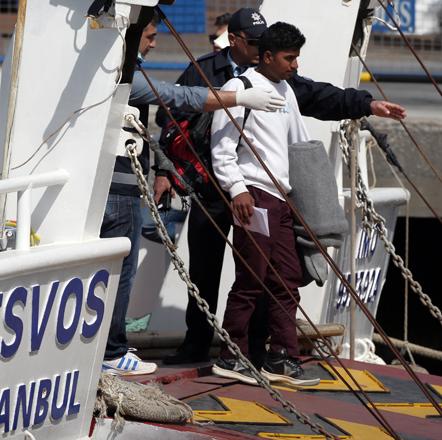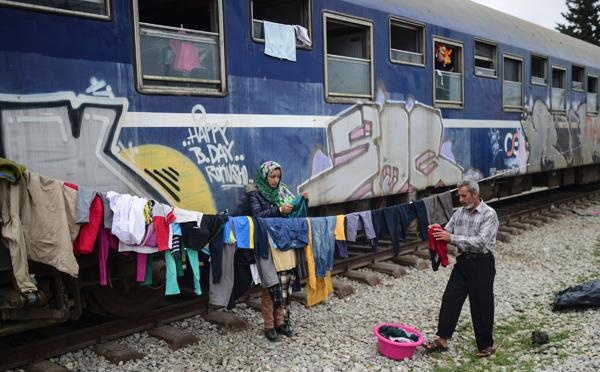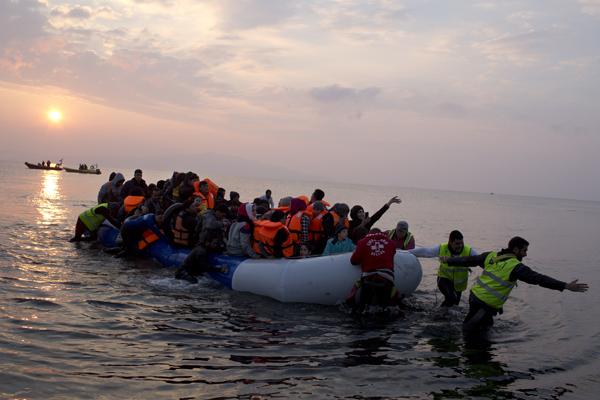You are here
Migrants sent back from Greece arrive in Turkey under EU deal
By Reuters - Apr 04,2016 - Last updated at Apr 04,2016

Turkish police officers provide security as migrants alight from a vessel transporting migrants from Greek island of Lesbos docked in Dikili Port, Turkey, on Monday (AP photo)
DIKILI, Turkey/LESBOS, Greece — The first migrants deported from Greek islands under a disputed EU-Turkey deal were shipped back to Turkey on Monday in a drive to shut down the main route used by more than a million people fleeing war and poverty to reach Europe in the last year.
Under a pact criticised by refugee agencies and human rights campaigners, Ankara will take back all migrants and refugees who cross the Aegean to enter Greece illegally, including Syrians.
In return, the European Union will take in thousands of Syrian refugees directly from Turkey and reward it with money, visa-free travel and progress in its EU membership negotiations.
Two Turkish passenger boats carrying 136 mostly Pakistani migrants arrived from the island of Lesbos in the Turkish town of Dikili, accompanied by two Turkish coast guard vessels with a police helicopter overhead.
A third ship carrying 66 people, mainly Afghans, arrived there later from the island of Chios.
The EU-Turkey deal aims to discourage migrants from perilous crossings, often in small boats and dinghies, and to break the business model of human smugglers who have fuelled Europe's biggest influx since World War II.
Turkish President Recep Tayyip Erdogan excoriated European governments' response to the crisis even as his government cooperated with the EU scheme.
"As Turkey, we embraced 3 million Syrian victims, but it is clear who tried to keep them away," He said in a speech in Ankara. "Did we send our Syrian brothers back? No we didn't. But they kept these people out of their countries by putting up razor-wire fences."
EU authorities said none of those deported on Monday had requested asylum in Greece and all had left voluntarily. They included two Syrians who had asked to return to Turkey.
European Commission spokesman Margaritas Schinas said the first returns were legal, even though Turkey has not yet made changes to its regulations that the EU said were necessary at the time of the deal.
The EU said at the time of the deal that Ankara would need to change asylum laws to give international protection to Syrians who enter from countries other than Syria, and to non-Syrian asylum seekers returned from Greece.
Migrants keep coming
Altogether, more people arrived on the Greek islands in the 24 hours to Monday morning than were transported to Turkey, Greek authorities said, putting total arrivals at 339.
A few hours after the first boat of returnees set sail from Lesbos, Greek coast guard vessels rescued at least two dinghies carrying more than 50 migrants and refugees, including children and a woman in a wheelchair, trying to reach the island.
"We are just going to try our chance. It is for our destiny. We are dead anyway," said Firaz, 31, a Syrian Kurd travelling with his cousin.
Asked if he knew the Greeks were sending people back, he said: "I heard maybe Iranians, Afghans. I didn't hear they were sending back Syrians to Turkey... At least I did what I could. I'm alive. That's it."
Two groups of mainly Pakistani men, totalling around 100 people, were also intercepted by the Turkish coast guard on Monday near Dikili, a coast guard official said.
Under the pact, the EU will resettle thousands of legal Syrian refugees directly from Turkey.
German police said the first 32 Syrian refugees arrived in Hanover on two flights from Istanbul on Monday under the deal. The European Commission said more flights were due in Finland on Monday and the Netherlands on Tuesday.
German Interior Minister Thomas de Maiziere said on Sunday that the "high point of the migrant crisis is behind us", but migration experts say the pressure to reach Europe will continue, possibly via other routes.
A few dozen police and immigration officials waited outside a small white tent on the quayside at Dikili as the returned migrants disembarked one by one, before being photographed and fingerprinted behind security screening.
The returnees from Lesbos were mostly from Pakistan and some from Bangladesh and had not applied for asylum, said Ewa Moncure, a spokeswoman for EU border agency Frontex.
Two buses escorted by gendarmes took the returned migrants to a "reception and removal" centre within a secure fenced compound in the town of Kirklareli near the Bulgarian border.
Turkish EU Affairs Minister Volkan Bozkir said any Syrians returned from Greece would be sent to the city of Osmaniye, around 40km from the Syrian border.
For non-Syrians, Turkey would apply to their home countries and send them back, Bozkir told Turkish broadcaster Haberturk.
Rights groups and some European politicians have challenged the legality of the deal, questioning whether Turkey has sufficient safeguards in place to defend refugees' rights and whether it can be considered safe for them.
Amnesty International's deputy director for Europe, Gauri van Gulik, visiting Lesbos, told Reuters: "It's almost based on the assumption Turkey is a safe country for refugees, and we've documented very clearly that it is not right now."
Amnesty last week accused the Turkish army of turning back thousands of Syrians trying to flee their country in the last few months, sometimes using force.
"The most important thing we lose sight of is that these are individuals who are fleeing horrific scenes of war and we're playing some kind of ping pong with them," van Gulik said.
The EU was determined to get the scheme started on schedule despite such doubts because of strong political pressure in northern Europe to deter migrants from attempting the journey.
There were small protests as the returns got under way.
Related Articles
LESBOS, Greece/CESME, Turkey — There was little sign of preparation on either side of the Aegean less than 24 hours before Greece was due to
ATHENS — Greek authorities were gearing up on Saturday to send hundreds of failed asylum-seekers back to Turkey, which is racing to set up r
LESBOS, Greece — Flimsy boats packed with migrants continued to land in Greece from Turkey on Sunday despite the start of a landmark deal be













